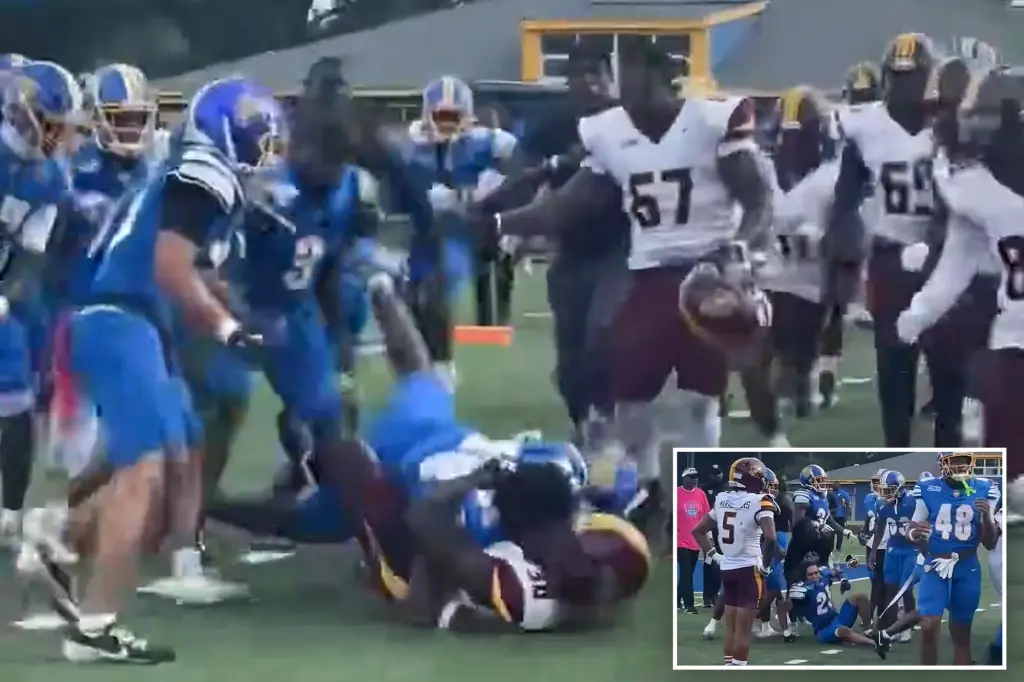College Football Brawl Leads to Multiple Suspensions After Homecoming Game
A tense homecoming weekend at Fort Valley State University (FVSU) escalated into chaos when a massive post-game brawl erupted between FVSU and Central State University (CSU) players following CSU’s narrow 18-14 victory. The incident, which was captured on video and quickly went viral across social media platforms, showed dozens of players in blue and white jerseys tackling each other to the ground, exchanging punches, and engaging in shoving matches as fans screamed from the stands. The stadium announcer desperately called for coaches and players to separate and return to their locker rooms while urging spectators to remain in their seats. What initially appeared to be calming down suddenly reignited when two opposing players clashed again, causing the dispersing crowd of athletes to surge back toward the track and stands in a second wave of confrontation. The disturbing display of unsportsmanlike conduct cast a shadow over what had otherwise been described as a competitive and spirited football game between the two historically Black universities.
The Southern Intercollegiate Athletic Conference (SIAC), the governing athletic conference for both schools, responded swiftly and decisively to the incident. By Monday, the conference had handed down one-game suspensions to 20 players—nine from Fort Valley State and eleven from Central State—as well as to both head coaches, Marlon Watson of FVSU and Tony Carter of CSU. Additionally, both programs were fined undisclosed amounts for their roles in the altercation. SIAC Commissioner Anthony Holloman expressed his profound disappointment in a press release, stating, “Acts of unsportsmanlike conduct have no place in intercollegiate athletics or within the Southern Intercollegiate Athletic Conference. I am extremely disappointed that this event has overshadowed what was otherwise a very competitive football game.” The conference, which primarily comprises Historically Black Colleges and Universities (HBCUs) and is headquartered in Atlanta, Georgia, reaffirmed its commitment to enforcing a “zero-tolerance policy” for unsportsmanlike behavior and announced plans to develop additional policies aimed at preventing similar incidents in the future.
Fort Valley State University issued a public apology to both its own community and to Central State University, acknowledging that the violent post-game behavior failed to reflect the institution’s core values of “sportsmanship, integrity, and respect.” In a statement posted to Facebook, the university emphasized, “We do not condone behavior that falls short of these standards, and we are taking the necessary steps to ensure that our student-athletes understand the importance of representing the University with Wildcat pride and professionalism on and off the field.” This commitment to accountability demonstrates the university’s recognition of the incident’s seriousness and its potential impact on the school’s reputation. The statement reflected not just an acknowledgment of wrongdoing, but also a pledge to use the incident as a learning opportunity for student-athletes regarding their responsibilities as representatives of their institution, both during competition and beyond.
The football brawl marked the second major controversy to hit Fort Valley State University during what should have been a celebratory homecoming weekend. Just days earlier, several members of the FVSU marching band had been arrested on hazing charges. The allegations were deemed so serious that university officials made the difficult decision to bar the entire band from performing at the homecoming festivities—a significant absence at an event where marching band performances typically play a central role in the celebration. According to reports from local news outlet 13 WMAZ, a criminal investigation had uncovered sufficient evidence to support charges against multiple band members, leading to their arrests and the immediate suspension of all marching band activities. The dual controversies created an unusually tense atmosphere during what is traditionally one of the most spirited and positive weekends in the university calendar.
Further details about the hazing investigation revealed the seriousness of the allegations. An incident report obtained by 13 WMAZ from the Fort Valley State University Police Department identified a 20-year-old female victim and two primary female suspects: Arika Tolbert, 21, and Jaya Williams, 19. The report noted that five additional female individuals were involved in the case in some capacity, though their specific roles were not detailed in the public documentation. The investigation has since been transferred to the Fort Valley Police Department, suggesting the potential for criminal charges beyond university disciplinary measures. In response to these allegations, FVSU released a statement acknowledging “the seriousness of this situation and the impact it has on our community,” while emphasizing that the “top priority is the safety and well-being of all our students and the entire Wildcat community.” This statement underscored the university’s commitment to addressing harmful behaviors within its community, regardless of the context in which they occur.
The dual controversies at Fort Valley State University highlight broader issues within collegiate athletics and campus culture that extend well beyond a single institution. The post-game brawl reflects the intense emotions that can accompany competitive sports and the challenge of maintaining sportsmanship when tensions run high. Meanwhile, the hazing allegations point to the persistent problem of harmful initiation practices that continue to plague student organizations across the country despite widespread anti-hazing policies and educational efforts. Together, these incidents serve as a sobering reminder of the ongoing work needed to foster healthy competitive environments and inclusive community spaces on college campuses. As both investigations continue and the suspended players and coaches face the consequences of their actions, the FVSU community and the broader SIAC conference are left to reflect on how best to uphold their stated values of respect, integrity, and sportsmanship in both victory and defeat. The resolution of these controversies will likely influence policies and practices not just at the involved institutions, but potentially across collegiate athletics and student organizations more broadly.


